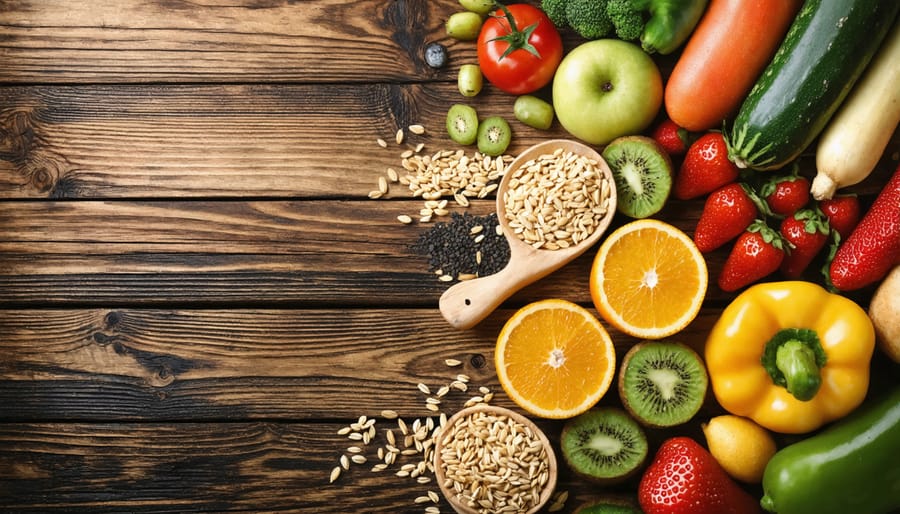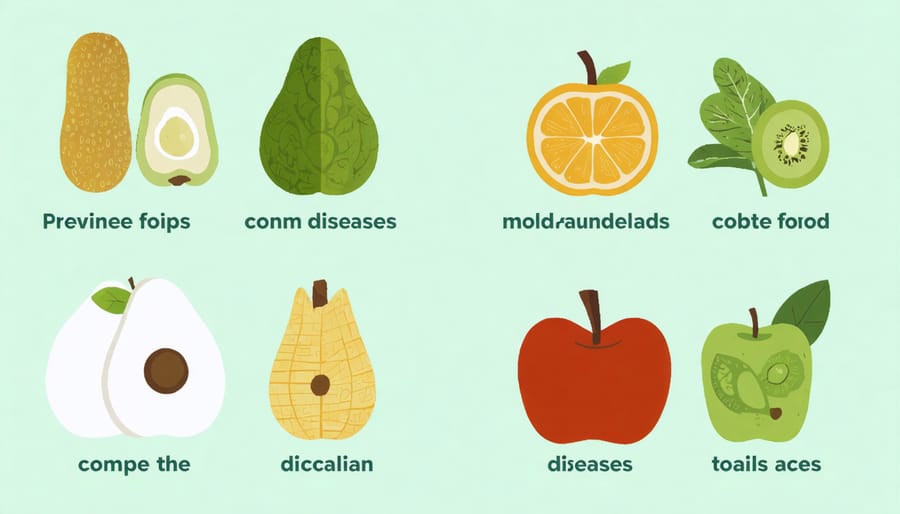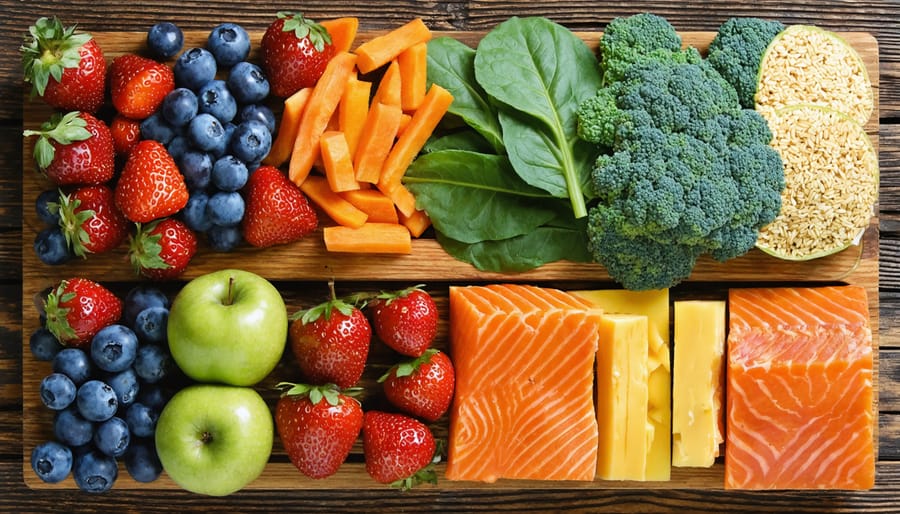Transform your health by making conscious food choices that nourish both body and mind. The benefits of healthy eating extend far beyond weight management, directly impacting energy levels, mental clarity, and long-term wellness. Research shows that people who maintain balanced eating habits are 42% less likely to develop chronic diseases and report significantly higher quality of life scores.
Here in Alberta, where busy lifestyles often challenge our food choices, establishing healthy eating patterns isn’t just about following a diet—it’s about creating sustainable habits that work with our unique routines and local food availability. Whether you’re managing existing health conditions or taking preventive measures, the food choices you make today shape your health outcomes tomorrow.
By understanding and implementing proper nutrition principles, you’re investing in your future health while enjoying the immediate rewards of increased vitality and improved well-being. Let’s explore how simple, practical changes to your eating habits can create lasting positive impacts on your health journey.
Why Your Food Choices Matter More Than You Think

The Science Behind Food’s Impact on Your Body
Think of your body as a sophisticated machine that runs on the fuel you provide through food. When you eat, your digestive system breaks down food into essential building blocks – proteins become amino acids, carbohydrates convert to glucose, and fats transform into fatty acids. These nutrients then travel through your bloodstream to nourish every cell in your body.
Good nutrition supports your immune system, helping fight off illnesses, and provides energy for daily activities. The vitamins and minerals in whole foods act like key workers, ensuring your organs function properly and your cells stay healthy. For example, the fiber in vegetables helps maintain gut health, while antioxidants from fruits protect your cells from damage.
Poor food choices, on the other hand, can lead to inflammation, energy crashes, and cellular stress. This is why eating a balanced diet isn’t just about weight – it’s about giving your body the tools it needs to work at its best.
Real Benefits Alberta Residents Are Seeing
Recent data from Alberta Health Services shows that residents who have adopted healthier eating habits are experiencing remarkable improvements in their well-being. In Calgary, 68% of participants in community nutrition programs reported significant weight management success, while Edmonton residents saw a 45% reduction in diet-related health issues.
Take Sarah Johnston from Red Deer, for example. After incorporating more local produce and whole grains into her diet, she reversed her pre-diabetes diagnosis within six months. In Lethbridge, the Thompson family cut their grocery bill by 30% while improving their nutrition by meal planning and choosing seasonal Alberta-grown vegetables.
Community health centers across the province report a 25% decrease in obesity-related consultations since 2020, attributing this success to increased nutrition awareness and better food choices. The Farm-to-Table initiative in Medicine Hat has helped over 500 families establish sustainable healthy eating habits, with 80% reporting improved energy levels and better sleep quality.
Building Better Eating Habits That Actually Stick
Start Small, Win Big
Making significant lifestyle changes doesn’t have to be overwhelming. The key to developing sustainable eating habits is starting with small, manageable steps that you can build upon over time.
Begin by choosing one simple change, like adding an extra serving of vegetables to your dinner or swapping your afternoon snack for a piece of fruit. Once this becomes routine, typically after about two weeks, introduce another small change. This gradual approach helps prevent the burnout that often comes with trying to overhaul your entire diet at once.
Consider these achievable starting points:
– Replace one processed snack with a whole food alternative
– Add a glass of water before each meal
– Include protein with your breakfast
– Pack a homemade lunch twice a week
– Try one new vegetable each week from local Alberta farmers’ markets
Remember to celebrate your small victories. Did you choose water instead of soda today? That’s a win! Made time for a proper breakfast? Another success! These seemingly minor achievements add up to create lasting change.
Keep a simple food diary to track your progress and identify areas for improvement. This visual record can be incredibly motivating as you witness your habits evolving over time.

Making Healthy Choices in Alberta’s Food Landscape
Alberta offers numerous opportunities for making healthy food choices, despite our long winters and urban lifestyle challenges. The province’s robust farming community provides access to fresh, local produce through farmers’ markets in major cities like Edmonton and Calgary, as well as smaller communities throughout the region.
Take advantage of Alberta’s seasonal bounty by visiting U-pick farms in summer and fall, where you can harvest fresh berries, vegetables, and even herbs at reduced prices. Many local grocery stores also feature “Alberta Grown” sections, making it easier to support local farmers while making nutritious choices.
For budget-conscious shoppers, community food boxes and good food clubs offer affordable access to fresh produce. The Leftovers Foundation in Calgary and Edmonton helps redirect surplus food to those in need while reducing food waste.
Stay informed about healthy eating through free resources available at Alberta Health Services’ nutrition services, including consultations with registered dietitians and community kitchen programs. Many recreation centers also offer cooking classes focused on healthy meal preparation.
When dining out, look for restaurants participating in Alberta’s Healthier Choice programs, which identify menu items meeting specific nutritional criteria. Remember to check nutrition information, which is mandatory for larger restaurant chains in the province.
Consider joining community gardens or starting your own vegetable garden to access fresh produce right at home, even if it’s just a small balcony garden with herbs and vegetables in containers.
Preventing Chronic Disease Through Smart Eating
Foods That Fight Back
Nature has provided us with powerful allies in our quest to prevent chronic diseases through nutrition. Here in Alberta, we’re fortunate to have access to many protective foods that can boost our health. Berries, particularly locally grown saskatoons and strawberries, are packed with antioxidants that fight inflammation. Dark leafy greens like kale and spinach support heart health with their rich mineral content.
Fatty fish such as salmon, abundant in our local markets, provides essential omega-3s that protect brain function and reduce inflammation. Cruciferous vegetables like broccoli and cauliflower contain compounds that support liver health and help prevent certain cancers. Local pulses, including chickpeas and lentils, offer fiber and protein while helping maintain healthy blood sugar levels.
Don’t forget about garlic and onions – these kitchen staples contain allicin, which supports immune function. Adding nuts, especially walnuts and almonds, can help lower cholesterol levels. Including these foods in your daily meals isn’t just about prevention – it’s about empowering your body with the tools it needs to thrive.

Your Daily Defense Against Disease
Every meal is an opportunity to strengthen your body’s natural defenses. Start your day with antioxidant-rich berries, which are plentiful at Alberta’s farmers’ markets during summer months. Add a handful to your morning yogurt or oatmeal to boost your immune system naturally.
Make colorful vegetables the star of your lunch and dinner plates. Dark leafy greens, bright orange carrots, and deep purple beets aren’t just visually appealing – they’re packed with disease-fighting compounds. Aim to fill half your plate with vegetables at each meal.
Don’t forget about powerful plant proteins like lentils and chickpeas, which are budget-friendly and readily available year-round. These legumes are excellent sources of fiber and help maintain healthy blood sugar levels.
Stay hydrated with water instead of sugary drinks. Add sliced cucumber or lemon for natural flavor. Remember to include healthy fats from sources like avocados, nuts, and olive oil – they help your body absorb nutrients and support heart health.
Keep healthy snacks like apple slices with almond butter or carrot sticks within easy reach. This simple strategy helps you avoid processed foods when hunger strikes.
Making It Work in Real Life
Transforming healthy eating habits from theory into practice doesn’t have to be overwhelming. Start by making small, manageable changes that fit your lifestyle. Instead of completely overhauling your diet overnight, try incorporating one new healthy habit each week.
Consider meal planning on weekends when you have more time. Take advantage of Alberta’s farmers’ markets for fresh, seasonal produce, and prep ingredients in advance for busy weekdays. Keep healthy snacks like cut vegetables or nuts at your desk to avoid vending machine temptations.
When dining out, many Alberta restaurants now offer healthier options. Don’t hesitate to ask for modifications like dressing on the side or extra vegetables instead of fries. For family meals, involve everyone in cooking – it’s a great way to teach healthy habits and make nutritious eating fun.
Dealing with time constraints? Batch cooking on weekends can provide healthy meals throughout the week. Use your slow cooker or prepare multiple portions of soups, stews, and casseroles that can be frozen for later.
If budget is a concern, remember that healthy eating doesn’t have to be expensive. Buy in-season produce, consider frozen fruits and vegetables, and explore local bulk food stores. Join community gardens or food co-ops to access fresh produce at lower costs.
When cravings hit, try the 15-minute rule: wait 15 minutes before giving in. Often, the urge passes, or you can satisfy it with a healthier alternative. Keep a food diary to identify patterns and triggers that challenge your healthy eating goals, then develop specific strategies to address them.
Making positive changes to your eating habits doesn’t have to be overwhelming. Start with small, manageable steps that fit your lifestyle and gradually build upon them. Try incorporating one new healthy habit each week, such as adding an extra serving of vegetables to your dinner or swapping sugary drinks for water. Remember, healthy eating is a journey, not a destination.
Take advantage of Alberta’s abundant local farmers’ markets and community gardens to access fresh, seasonal produce. Connect with local nutrition programs and support groups in your area to stay motivated and accountable. Many community health centers offer free nutrition workshops and cooking classes that can help you develop practical skills.
The benefits of healthy eating extend far beyond physical health – they impact your energy levels, mood, and overall quality of life. By making mindful choices about what you eat today, you’re investing in your future well-being. Every healthy meal choice is a step toward a healthier you.
Don’t wait for the perfect moment to begin. Start with your next meal, and remember that small, consistent changes add up to significant results over time. Your future self will thank you for the positive choices you make today.

